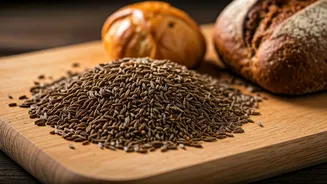Brain's Weight Loss Tip
A neuroscientist has highlighted a unique approach to weight loss that involves a crucial dietary habit: eating certain foods directly before each meal.
This method is not just about shedding pounds; it's about optimizing your body's function and enjoying a range of health benefits. By integrating this practice, you're not merely focusing on weight loss; you're also improving your overall health. The neuroscientist emphasizes that this is a simple yet highly effective way to support your well-being, making it a practical strategy for everyday life. This approach capitalizes on the body's natural processes to encourage healthy weight management and provides a strong foundation for better health.
Food Choices Matter
The secret behind the neuroscientist's advice lies in the choice of food. The focus is on selecting foods that can significantly impact how your body processes meals, particularly in terms of weight management. These foods typically include those rich in fiber, lean proteins, and complex carbohydrates. These options aid in feeling full faster, curbing the overeating that might cause weight gain. High-fiber foods, for example, help by slowing down the digestion, which stabilizes blood sugar levels. Lean proteins support muscle health and help with satiety. Complex carbohydrates, unlike simple sugars, offer a sustained release of energy, which is vital for reducing cravings. Integrating these food choices into your pre-meal routine creates a more favorable environment for successful weight loss and overall health benefits.
Health Benefits Uncovered
Beyond weight loss, eating specific foods before meals offers a plethora of surprising health benefits. This practice can positively impact blood sugar levels, reduce the risk of certain diseases, and boost overall energy. Foods that are high in fiber can effectively manage blood sugar spikes after meals, reducing the risk of type 2 diabetes. In addition, including lean proteins in your diet helps support metabolic health and muscle mass. This pre-meal strategy provides an opportunity to improve your digestive health, leading to better nutrient absorption and reducing inflammation in the body. Embracing this approach extends beyond just weight loss; it's about improving your health and increasing your overall well-being.
Practical Mealtime Strategy
Implementing the neuroscientist's advice is straightforward. It starts with planning your meals and strategically incorporating the right pre-meal foods. Start by identifying the foods that work for you, such as a small portion of a high-fiber salad or a protein-rich snack. Then, eat these foods about 15 to 30 minutes before your main meal. This pre-meal snack allows your body to prepare for the food and maximize the health benefits. Consistency is crucial; the more frequently you practice this method, the more likely you are to experience improvements in both weight management and overall health. Make it a routine, and consider how this practice can be integrated seamlessly into your daily life.
Sustained, Long-Term Success
The neuroscientist's approach is designed for long-term success. It’s not about a quick fix; it’s about making sustainable lifestyle adjustments that support health and well-being. Combining pre-meal eating with regular physical activity and a balanced diet builds a robust foundation for weight loss and sustained health. This approach promotes a healthier lifestyle and fosters good habits, ultimately improving overall health. Moreover, this easy-to-follow dietary practice highlights the powerful connection between food and health, reminding us that the decisions we make about what we eat significantly affect our well-being.




















